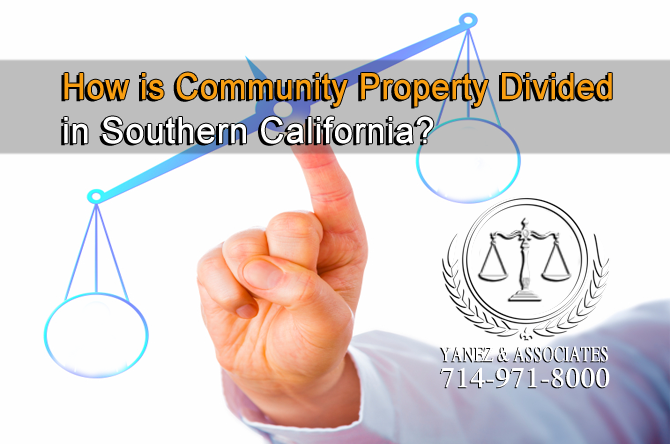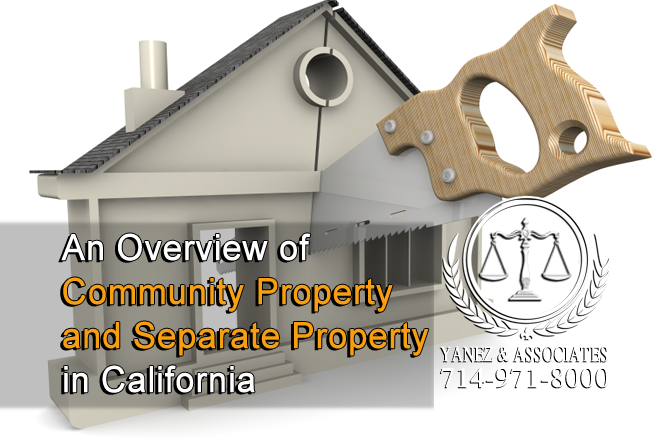Community Property Division FAQ: I have high assets in Orange County California; Is My Spouse Entitled to 50 Percent of My Assets since we live in a community state?
Is My Spouse Entitled to 50 Percent of My Assets in a Divorce in Orange County?
The process of dividing property and debts in a California divorce can be one of the most time consuming and complicated processes that divorce requires. However, your spouse will not necessarily end up with half of your assets in a divorce. Determining what each spouse is entitled to and what each spouse is responsible for can vary depending on the specific situation that the couple is in at the time of the divorce.
California is a community property state. Basically, this means that property and debts need to be classified as either community property or separate property, and the community property will be divided between the two parties. This division of community property is not necessarily 50 percent, especially when more complex assets like retirement accounts and military pensions are included, but community property is divided equally.
Issues may arise during the process of classifying property as either community or separate, or it may arise when it comes to valuing assets like retirement accounts or businesses. If one party is hiding assets or spends large amounts of community funds once the divorce petition has been filed, that party may be penalized during the process of dividing property and debts.
Depending on whether you and your spouse can come up with your own agreement as to how to divide property or debts, how much property and debts you have to divide, and how cooperative both parties may be with one another, the process can vary greatly. A high asset divorce is usually more complex than one with fewer assets and debts. It is always a good idea to discuss your divorce, and both the classification and division of property with a qualified divorce lawyer in Orange County. You may also need to hire other professionals, such as accountants or professional valuators to help you throughout the property division process.
An Overview of Community Property and Separate Property in California
When a couple divorces in California, property and debts will need to be divided between the couple as part of the divorce. To get started, you will need to understand several terms that will be used during this process.
Property
Property can be bought and sold. This can include vehicles, a home, a business, clothing, furniture, and other physical items. It also includes other assets, like cash, bank accounts, retirement accounts, 401 k plans, pension plans, life insurance, and patents.
Debt
Debt is money that the couple owes. This can be from car loans, credit card debts, student loans, home loans, and more.
Community Property
In the simplest terms, community property includes debts and property that the couple has acquired after the date they were married or the date they registered their domestic partnership - with the exception of gifts and inheritances - and before the date of separation. This is the property that they own together, and it can include anything from a vehicle to furniture to anything either party has earned from work done during the marriage. It also includes any financial obligation that was initiated during the marriage, even if the debt was incurred only in the name of one spouse.
Separate Property
In the simplest terms, separate property includes any debts or property that either party acquired prior to the date of the marriage or the date that the domestic partnership was registered, or after the date of separation. It also includes any inheritances or gifts that were given to or inherited by one spouse during the marriage or registered domestic partnership. Income that is earned from separate property, like rental income from a property that either party owned prior to the marriage or registration of the domestic partnership is also considered to be separate property, as is anything bought with an inheritance. Debts may be considered separate as well, if they were incurred in one party’s name prior to the date of marriage or registration of the domestic partnership, or after the date of separation.
Quasi-Community Property
Property that was acquired while living outside of California, either by one or both spouses, is considered quasi-community property. This property would have been considered community property had the couple been living in California at the time. An example of this is if you and your spouse were previously living and working in Michigan, where you bought a car, and brought it to California when you moved - it is considered quasi-community property.
Commingling
One of the more confusing aspects of the division of property is commingling of community property and separate property. Sometimes things that were once separate property can become community property, and vice versa.
For example, if either party has separate property, like a condo that was purchased prior to the date of the marriage or registration of the domestic partnership, and then either sells or rents out that condo, the proceeds are still considered separate property. However, if the proceeds from the sale or rental are used to purchase a house, and either of the two parties use money they have earned after the date of marriage or registration of the domestic partnership, they have used both separate and community funds to pay for the house. Therefore, the equity in the home is commingled.
How is Community Property Divided in Southern California?

Over the years my spouse and I combined/mixed our property, now that we are thinking of divorcing, how will our Property be Divided in Orange County, California?
Commingling can be one of the hardest issues to deal with in California - but other things can make the division of property more complex as well. Dividing a business, for example, can be extremely difficult, especially if one spouse is feeling vindictive, or if the spouses run the business together and can no longer work together peacefully.
Appraisers, accountants and other professionals may be needed to help the spouses find accurate values to certain types of property.
Sometimes, when it comes to things like homes and businesses, one spouse will buy out the other so that instead of dividing it in half, one spouse ends up with the home or the business, and the other spouse gets more of another asset. Things like homes and businesses may also be sold, and the profits divided between the spouses. If you are one half of a high asset divorce, this may be a good option for you if your spouse agrees to it.
It is important to remember when dividing debts that while the spouses may agree to the division of debts, both spouses can still be legally held responsible to pay the debts by the creditor. If the spouse responsible for a debt fails to pay it and the creditor does request the other spouse pay it, that spouse may ask the court to place a lien on the first spouse’s separate property to ensure that the divorce agreement is upheld.
The Legal Process
California divorces (and legal separations) require that both spouses or partners fill out a Schedule of Assets and Debts as part of their Financial Declaration. A divorce will not be granted without a Financial Declaration.
In the Schedule of Assets and Debts, each spouse will be required to declare all of their assets and debts, both community and separate. It is always best to be honest here - California has strict penalties for lying or hiding assets.
Once both parties have completed their Schedule of Assets and Debts, they can compare the results to see if there is a difference in either the classification of property or debts, or in the values of community property.
If both parties agree, you may be able to determine how to divide your property and assets on your own. If not, you may need to go to trial.
Special considerations may be made when minor children are involved, especially when it comes to the family home or spousal support - but custody and support orders do not generally relate to the division of property and debts.
Orange County Property Division Lawyers at Yanez & Associates
The division of property and debts in California can be complex. However, like most things related to divorce, every family, every situation, and every divorce is unique. If you have any questions regarding how the law can be applied to your situation, it is always a good idea to discuss your concerns with a qualified attorney. Divorce lawyers have experience in applying the law to situations like yours, and can provide you with relevant legal advice. While researching on the Internet can certainly be helpful, there is no replacement for actual legal advice from a professional attorney.
Many lawyers in Southern California offer a free initial consultation, which allows the attorney to get to know you and the specifics of your case, while allowing you to get to know your lawyer and decide whether or not you want to continue working together, without any financial risk. It also gives you an opportunity to ask questions from a professional. Schedule your free initial consultation with a family lawyer at Yanez & Associates today.














